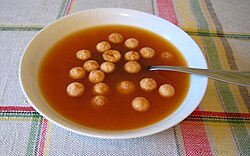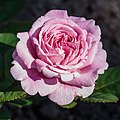Rose hip soup
 A bowl of rose hip soup with small biscuits made from almonds, sugar, and egg whites. | |
| Alternative names | nyponsoppa |
|---|---|
| Type | Beverage or Soup |
| Course | Breakfast or Dessert |
| Place of origin | Sweden |
| Serving temperature | Cold or Hot |
| Main ingredients | Rose hips, sugar, water, potato starch |
| 83-1,608 kJ per 100g 20-384 kcal per 100g [1] kcal | |

Rose hip soup (Swedish: nyponsoppa) is a Swedish soup made from rose hips.[2] It is served as a beverage or as a dessert with milk, cream or vanilla ice cream along with small almond biscuits.
Rose hip soup may be eaten for breakfast. The types of soup for that purpose are generally lower in fruit content and more watery, and may be served with pieces of crisp bread.
Description and preparation
[edit]The best rose hips or nypon to make the soup are the large hips of Rosa rugosa, but the smaller hips of Rosa canina and Rosa dumalis are also commonly used.[3][4] The hips form after the rose petals have fallen off. They are picked after the first frost of the fall, once ripe and red, then dried.[5] Nyponsoppa is typically made with dried rose hips, water, potato starch (as a thickener), and sugar. The rose hips are boiled until they are soft and then blended with a mixer. The mixture is then run through a sieve and thickened with potato starch.[6] Rose hips are rich in vitamin C.[citation needed]
See also
[edit]References
[edit]- ^ "The Food Database" (in Swedish and English). National Food Administration (Sweden). pp. "Rosehip soup ready-to-eat powder unsweetened fortified" and "Rosehip soup dried powder fortified". Archived from the original on 18 August 2012. Retrieved 15 June 2012.
- ^ "Rose Hip Soup Recipe". About.com. Archived from the original on 16 August 2016. Retrieved 29 March 2020.
- ^ Kalf-Hansen, Rune; Sundgren, Lisen (2016-07-01). Det vilda köket (in Swedish). Bonnier Fakta. ISBN 978-91-7424-636-0.
- ^ Duxbury, John. "Rosehip soup (Nyponsoppa)". www.swedishfood.com. Retrieved 2020-01-15.
- ^ Swedish Recipes: Old and New (1955) (Page 6) "American Daughters of Sweden". Archived from the original on 2011-07-24. Retrieved 2011-01-15.
- ^ Stempel, John-Lewis (2012). Foraging: The Essential Guide to Free Wild Food. Constable & Robinson. p. 67. ISBN 9780716023210.

